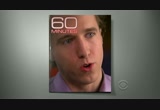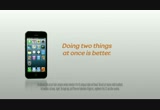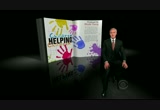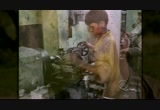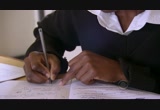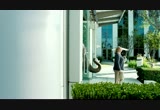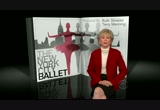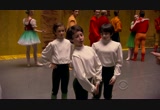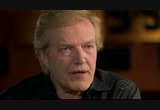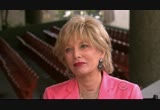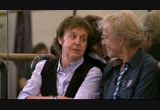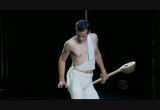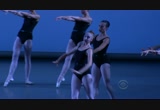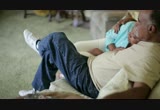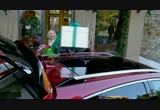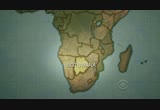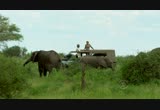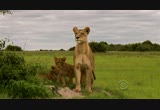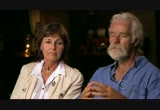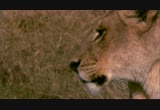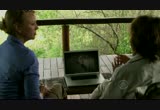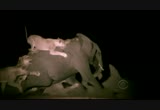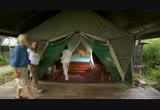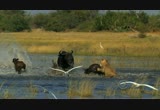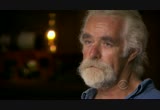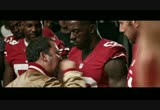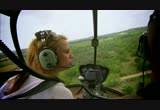tv 60 Minutes CBS November 25, 2012 7:00pm-8:00pm PST
7:00 pm
and the tools to change the world, it'll change their own lives also in the process. and the ripple effect is incredible. >> are we ready for "we day"?! >> we are! >> pelley: you can feel that ripple in the free the children celebrations that kielburger calls "we day." he does as many as nine of these a year, and when we came to this one in vancouver, there were 20,000 kids. >> kids are looking to get involved. they're searching for it. and not only is it good for the child, my god, our world needs it. ♪ ♪ >> stahl: last week, the new york city ballet debuted their annual performances of "the nutcracker," one of the most famous ballets of all. so we decided to peek behind the curtain to witness the beauty, grace, and athleticism that goes into classical ballet. "60 minutes" didn't have to dig too deep to find out there's some drama, too. you once said about ballerinas,
7:01 pm
"they're always bitches. they are all tough, merciless, self-centered." >> it's fundamentally true. >> logan: beverly and dereck joubert have made more movies about lions than anyone alive. they've documented some of the most dangerous and memorable moments of africa's big cats. they told us what keeps them in the bush after all these years is the thrill of making new discoveries, like their contribution to the discovery of these water-loving super lions. >> their physique started to change. you could see that they were getting huge pectoral muscles and huge necks. these lions were at least 15% larger than any other lions we had been working with. >> i'm steve kroft. >> i'm leslie stahl. >> i'm morley safer. >> i'm bob simon. >> i'm lara logan. >> i'm scott pelley. those stories tonight on "60 minutes."
7:02 pm
[ phil ] i have a toyota camry hybrid. [ man ] tell me about that. [ phil ] katie and i talked about really committing to making a difference in the amount of gas that we use. she was using 8 to 10 tankfuls. i was using 5 tankfuls. now i use one tankful a month, and she may use about two. it drives like a sports car. it handles very well. people are a little surprised that a hybrid zipped by them the way that i do. [ male announcer ] see phil's story and more at the camry effect.
7:03 pm
camry from toyota. [ male announcer ] see phil's story and more at the camry effect. i am too young to the heat, it just rises up... you know, somebody just put you in front of a fire. can i just tell you, this does nothing to help it. poise invites you to experience a new kind of hot flash comfort. join the 2nd talk with poise. consider an aarp medicare supplement insurance plan, insured by unitedhealthcare insurance company. to learn more, call today and request your free decision guide. it can help answer some of your questions about medicare. so don't wait. it can help answer some of your questions about medicare. hey buddy, i bet mom would love this, huh? jack? jaaack? jaaack?! jack?! looks good ladies! jack! come on, stop the car. jack! no, no, no, no, no! the only thing more surprising than finding the perfect gifts.. niice. ...is where you find them. how did you know? i had a little help.
7:04 pm
this is how to gift. this is sears. so all of you do. yes, for sure. now what's better? being able to shoot two lasers out of both of your eyes at the same time or just one laser out of one eye? [ all kids ] two! [ moderator ] okay, why? if it's just one beam -- okay, it does a little bit of damage. two beams -- it will make something explode! and that's more fun? yeah! and it's more powerful you're saying? yeah! [ male announcer ] it's not complicated. doing two things at once is better. and only at&t's network lets you talk and surf on your iphone 5. ♪ and his new boss told him two things -- cook what you love, and save your money. joe doesn't know it yet, but he'll work his way up from busser to waiter to chef before opening a restaurant specializing in fish and game from the great northwest. he'll start investing early, he'll find some good people to help guide him, and he'll set money aside from his first day of work to his last, which isn't rocket science. it's just common sense.
7:05 pm
from td ameritrade. >> pelley: the things that we're thankful for tend to come from people who devote their lives to something greater than themselves. many folks come to that devotion late in life, but craig kielburger discovered it early. he was in seventh grade when the death of a boy changed his life. it was a change so profound that, through kielburger, it has now saved and transformed other lives all around the globe. in that moment, 17 years ago, craig kielburger was struck by a profound truth-- something as
7:06 pm
important as changing the world can't be left to grownups. >> craig kielburger: kids are looking to get involved. they're... they're searching for it. and in an era where, you know, adults often are looking for meaning and purpose in their lives, kids also want to assert who they are, not just by the video games they play or the peer groups they belong to, but by the contribution they make. and that's part of a youth self- identity in the world. and not only is it good for the child, my god, our world needs it. >> pelley: craig kielburger was a child when he noticed the needs of the world. as a 12-year-old in canada, he read about the murder of a boy his age in pakistan. iqbal masih was a slave in a carpet factory. masih escaped to lead a campaign against servitude. but within two years, he was silenced. kielburger put down the newspaper and rose to speak. >> kielburger: we're talking about labor and the exploitation of children. >> pelley: he made iqbal masih's
7:07 pm
fight his own. he talked to classmates, to congress, to parliament. to call him precocious is an understatement, as our own ed bradley found out in 1996. >> bradley: but what made you think you could do something about it? >> kielburger: originally, i didn't think i could, really. but the only way we're going to ever find out is try. so after doing some research, i just walked to my classmates and said, "listen, i read this article. here's a problem. this is what i know"-- which, at that point, was not very much-- and asked, "who wants to help?" >> pelley: turned out 11 friends wanted to help. with no money to start with, no wealthy parents or early backers, they met in his living room and started a charity called "free the children." >> bradley: why you? >> kielburger: why not? if... if everyone in the world could say, "why me?" then nothing ever would be accomplished. why me? because i've met those children. because i've seen them. because i read the story of iqbal masih. why not me?
7:08 pm
>> pelley: in the 1990s, kielburger wanted to free children from slavery. so he went to asia, recruiting activists and government authorities to bust child sweatshops and sex traffickers. there were early successes. but when we went overseas with kielburger, he told us freeing children was much more complicated than he had first imagined. what are some of the things that didn't work out? what have you learned? >> kielburger: you know, probably the lowest moment ever was the first time in southeast asia, when we met children who we had freed before who are back in slavery. to see that some of those same kids would end up back in the same grinding, backbreaking, desperate poverty, there is nothing that makes your heart fall more than that. >> pelley: kids he freed were being pulled back into servitude, years later, by centuries-old culture and traditions shaped by poverty and illiteracy.
7:09 pm
at the point that you saw that your original big idea wasn't working, why didn't you throw in the towel? >> kielburger: there were points where... frankly, where there was a frustration, anger, and maybe a slight desire to throw in the towel, but never a consideration of it seriously. because that first trip i took-- before i sat down with ed bradley and that first "60 minutes" episode that was a turning point in our lives-- that first trip, i made promises to a lot of kids there that, at that time, there was almost nothing that free the children could do in practice. we didn't have schools and projects and offices around the world, and the only thing i could promise them at that point was that i would share their stories with whoever would listen. and i just wouldn't give up. and when you make a promise, you have to fulfill it. >> pelley: the way to keep that promise, he decided, was to attack hardship and ignorance, the very roots of slavery. today, free the children is in 45 countries, a $30-million-a- year charity building schools, providing clean water, and connecting local craftsmen to
7:10 pm
world markets where their traditions bring in good money. there are two million volunteers, nearly all of them under the age of 18. >> kielburger: so free the children today is the world's largest network of children helping children. so what that means, in practice, is we inspire kids. then, we give them all the tools they need to learn about these issues-- speaking tours, summer leadership camps, curriculum every week. our bet that we're making is, if you give kids the inspiration and the tools to change the world, it'll change their own lives also in the process. and the ripple effect is incredible. >> are we ready for "we day"? >> we are! >> pelley: you can feel that ripple in the free the children celebrations that kielburger calls "we day." he does as many as nine of these a year, and when we came to this one in vancouver, there were 20,000 kids.
7:11 pm
♪ ♪ >> pelley: we days feature acts like nelly furtado... ♪ ♪ >> pelley: ...jennifer hudson, and lectures by activists, including nobel peace prize winner desmond tutu. but listen to what happens when kielburger takes the stage. ( cheers and applause ) >> kielburger: we day isn't just a day; we day is a movement, a movement that happens all year long. >> pelley: kielburger is joined on stage every we day by his older brother marc, who manages the financial side of free the children. >> marc kielburger: ...just like you coming together and taking action. >> pelley: when we see in the stadium all those faces of all those kids, how did they get there? >> craig kielburger: you can't buy a ticket to we day. any kid can earn their way in for whatever cause they care
7:12 pm
about-- half local, half global. and they're there. these are kids who have done, you know, bake sales and car washes and volunteered at retirement homes and local support lines, and they've started their own charities, and when they leave, they bring that inspiration. we day is just the beginning. >> i need the one with the chocolate chips. >> pelley: we followed that bake sale money back to st. ann's school in bridgeport, connecticut. free the children recruits through schools, almost turning them into chapters of the global organization. there is so much trouble in the world. >> magdalena dukowska: yes. >> pelley: when we met 11-year- old magdalena dutkowska and 12- year-old joey hopkins, they were headed to kenya, inspired by their first we day. >> dukowska: we day is like the biggest thing in the world. it's like the greatest event that could ever happen, and so it's just all these important people coming to one day to one event to talk about how we can change the world. >> craig kielburger: when a child donates their birthday money, there is an incredible
7:13 pm
responsibility that comes with that to make sure... we have kids who have walked up to us and handed us a piggy bank. there is such a responsibility to make sure that money gets to where it's supposed to go. >> pelley: when the bake sale money comes in and the piggy bank money comes in and you count that up, what's it come to? >> craig kielburger: well, you know, the average kid probably gives, you know, somewhere between $1, maybe $5, maybe $10. over the course of a school, that's maybe $1,500 around... >> pelley: so, how do you... how do you save the world on that kind of money? >> craig kielburger: oh, that adds up to millions and millions of dollars, tens upon tens of millions of dollars every year for our projects. a penny is almost like a kid-- people walk past pennies all the time and ignore them, think they... they're insignificant, kind of like kids. you don't really think twice, "can they really make a difference?" but when you bring enough young people, enough kids together, then suddenly, those kids can change the world. >> pelley: and this is one of the places that kielburger set out to change, the masai mara in kenya.
7:14 pm
the mara offers nearly every wonder of east africa. the traditions of the masai people are rich, but their access to water and education is among the poorest in the world. joey hopkins and magdalena dutkowska raised enough money back in connecticut to join other volunteers to build a new classroom here. each year, 2,400 kids lend their hands overseas. over the last ten years, 130 schools have been built in kenya. this one was finished in 2010. now, 91 students are enrolled, among them sharon, naiomi, faith and marcella. sharon, let me start with you. what does this school mean to you? >> sharon: it means a lot to me, because, at first, i could not even talk to people like you now. i did not understand english well. but now, this school has helped me a lot to know more english and gain more confidence.
7:15 pm
>> pelley: how long have you been in this school? >> sharon: one and a half years. >> pelley: you've learned this much english in one and a half years? >> sharon: yes. >> pelley: that's amazing. how many of you think you're going to go to university? everybody. and now, a university education will be open to more students because, after three weeks here, a new classroom was built by the kids of free the children. with two students at each desk, this classroom will hold about 50. >> ( singing ) >> pelley: at the end of the project, the masai honored magdalena and joey with a celebration and a traditional gift. >> joey hopkins: i was just standing there with my goat that they gave me. i was just like, "wow." our... like, we did this and we gave this new education to these
7:16 pm
kids, and now they are so grateful for it. >> pelley: what are you going to do with the goat? >> hopkins: well, i haven't seen my goat in a while, actually. so i miss it, but... i'm going to have to leave it here in kenya. >> pelley: leave it here? don't you think your mother would like to have it back in connecticut? >> hopkins: i wish she would, but we can't even have a dog, let alone a goat. >> pelley: what are you going to tell the kids back at school about the experience here? what do they need to know? >> hopkins: what they need to know is that poverty is a real thing, and starve... kids starving, like, that are five or four years old is a real thing; that not everyone in the world can just go downstairs, turn on the tap, and get a glass of water; and that not everyone has a proper education. and that you should really be thankful for the things you have. >> pelley: by the time they cut the ribbon, it was hard for us to figure which kids had gained the most.
7:17 pm
the kenyans got a new classroom, but it was the american kids who learned they can be the change in the world. >> cbs money watch update sponsored by: >> good evening. the national retail federation projects holiday shoppers spent $59 billion this long weekend. that's up 12% over last year. the number of sales on mobile devices jumped 60%. it was the biggest thanksgiving weekend ever at the box office. $290 million. i'm jeff glor, cbs news. it's my favorite time of year again
7:19 pm
and now -- i got a great new way to get deals. it's called bankamerideals, from bank of america. i choose the cash back deals in my mobile or online banking. i just use my bank of america debit or credit card when i pay. and i get as much as 15% cash back -- put into my account. this is on top of other rewards and discounts i already get. best of all -- it's free. happy holidays. [ male announcer ] introducing bankamerideals, free for online banking customers. sign in to your online banking to choose your deals today. free for online banking customers. oh, it's great! now i can brew my coffee just the way i love it. how do you do that? well, inside the brewer, there's this train that's powerful enough to carry more coffee and fresh water to make coffee that's stronger and bigger...
7:20 pm
and even hotter! actually, i just press this button. brew the coffee you love -- stronger, bigger, or hotter -- with the keurig vue. >> stahl: the new york city ballet is america's largest and, some would say, finest ballet company in the world-- the dancers are like the new york yankees in tutus and tights.
7:21 pm
they are artists and athletes at the same time, and it is a marvel to see them up close, as you will tonight. most of them are home grown in the u.s.a. full disclosure-- i am a big fan, and even served on the board of the new york city ballet, which was founded in 1948 by the great choreographer george balanchine. he revolutionized classical dance and ushered in a golden age as ballet master of the company. now, at a time when many cultural institutions are under stress, we went behind the scenes to see how this company is keeping this elegant art form alive. ♪ ♪ the dancers at the new york city ballet epitomize the beauty, athleticism, the seeming effortlessness, and the grace of
7:22 pm
classical ballet. ( applause ) ♪ ♪ saving it from becoming a dying art form has fallen on the shoulders of this man, peter martins, ballet master in chief of the new york city ballet since 1983. >> peter martins: and... >> stahl: martins teaches and trains. >> martins: ...advance forward. >> stahl: he's one of the company's top choreographers. he oversees fund raising and marketing. if the ballet were the yankees, he'd be both the general manager and the coach. >> martins: that's good. >> stahl: but when he first took the helm, just about everyone thought the ballet could not survive the loss of george balanchine. how hard was it to be the ballet master after the great genius of all time? what kind of a burden was that? >> martins: i felt an obligation, if that's the right word, to try to take care of all the things he had done and he'd created... ♪ ♪
7:23 pm
...that if you didn't really commit yourself to preserve and protect, it'd fall apart. i thought, you know, "somebody has to devote their life to this." >> stahl: and so he has. he's managed not only to bring the company into the 21st century, introducing new choreography, more than any other company in the world, he has also succeeded in sustaining the legacy of the great balanchine. what better person to preserve balanchine than one of his favorite male dancers? "mr. b" brought martins to new york from the royal danish ballet. and he became a star, linked romantically to one ballerina after the next. people used to go to the ballet just to see him. but balanchine believed martins' great value was showcasing his ballerinas. >> martins: i took great pride
7:24 pm
in making her look better. it appealed to me. >> stahl: you once said you didn't even like performing that much when you were the big star. >> martins: yeah, i did not. it was not my great thing. i think it was sort of a strange shyness. you know, when you walk out of that wing, and you know there's 2,500 people looking at you, like, "don't look at me." >> stahl: how interesting for a performer. >> martins: maybe that's why i liked to be behind the girl. >> stahl: but being behind the girl didn't always mean that martins liked the girl. you once said about ballerinas, "they're always bitches. they're all tough, merciless, self-centered." >> martins: i was probably young when i said that. >> stahl: well... >> martins: i would be a little more moderate now. but it's fundamentally true. >> stahl: but to be good enough to dance for peter martins' company, a ballerina has to be driven and tough-minded. >> martins: the great challenge
7:25 pm
for a ballet dancer is to show the beauty and grace of ballet without showing the effort. >> one... >> stahl: and for virtually all of the dancers in the company today, that challenge started at the nearby school of american ballet. >> martins: you guys are very good. >> thank you. >> martins: you're very good now, but be careful not to be mechanical. know what i mean by that? a little more elegant. you don't want to go like this. but you want to be on the music. one, two, three, four, five, six. perfect, perfect, perfect. okay, good luck. >> stahl: all but nine of the 83 dancers in the company are american, from all over the country, and all of them have now been handpicked by peter martins. >> martins: look at this. nice. >> stahl: they go to class every morning, where they're drilled in the balanchine technique, which is fast and a little off
7:26 pm
kilter. >> martins: a little faster. >> stahl: they rehearse every afternoon, often with martins working them and himself hard. and then, they perform at night. they're at it more than eight hours a day, making them as fit as top athletes of any sport. >> martins: that's right. we all cannot lose touch with the difficulties of mastering classical ballet to the extreme utmost beauty. it is such an impossible task. you will never attain it, and we know it. but you have to strive for it. >> stahl: new york city ballet, whose home is at lincoln center, is the mother ship for ballet in america. there are nearly 150 companies around the country, many of the larger ones run by alumni from here. but classical dance is suffering, and so is the temple of balanchine, with attendance down considerably from his day. the audience is graying; young
7:27 pm
people tend to see classical ballet as stuffy and inauthentic. but there's a lot of interest in dance. we have "dancing with the stars." people are watching more dance on television. >> martins: right. right. >> stahl: but not ballet. >> martins: i have a theory. >> stahl: what's your theory? >> martins: because the soviet union fell. the greatest popularity ballet had probably in history was when... with russian defectors. when baryshnikov and nureyev defected, it gave it a mystery. when baryshnikov danced for the new york city ballet, we had sold-out houses all the time. >> stahl: the russian defectors made ballet part of the cold war; going to see them was going to see heroes. so what's martins doing now to bring those big audiences back? >> martins: ladies and gentleman, can i introduce you to sir paul mccartney? ( applause ) >> stahl: if anything's going to attract a new crowd, it'll be a beatle. martins commissioned sir paul to
7:28 pm
compose the music for a new ballet that he choreographed. >> paul mccartney: the most exciting thing for me personally was seeing the dancers start to bring the whole thing to life. you know, it's kind of goosebumps time. it's like, "whoa." >> stahl: we were there when he came for a rehearsal of "ocean's kingdom," a fairy tale about two lovers separated by an evil king. >> mccartney: people kiss in ballets? they do? it's okay then. ( laughs ) >> stahl: opening night-- on stage, there's the fairy princess and the evil king with his henchmen. it's a night with leaps of fantasy and a happy ending, sort of. ( applause ) you go to paul mccartney, which was partly to bring in a new audience, and you're criticized for it. >> martins: did you think that i thought i wasn't going to be? >> stahl: did it work? >> martins: oh, it packed the
7:29 pm
theaters. absolutely, it worked. >> stahl: but the critics-- oh, my god. oh, my god. i mean, here's what some critics said about the mccartney piece. that it was a gimmick, and that you were just pandering to the audience to bring him in here. they say that your ballets are unemotional and unexciting. >> martins: so? >> stahl: it hurts. >> martins: when you say "hurts," that would suggest that you always think that they know better, that they know what they're talking about. what matters really is what you think. >> stahl: balanchine said that ballet is woman. >> martins: well, he preferred women, but he knew he needed us. >> stahl: promoting the male dancers is part of martins' push to woo young people with his own young dancers, like 25-year-old robbie fairchild who, the night we were there, was making his new york city debut in balanchine's masterpiece,
7:30 pm
"apollo," a role martins made famous. fairchild has wanted to perform it since he was the only boy in his ballet school. >> robbie fairchild: i came from utah, so god help you if you told people you did ballet. and i got, like, you know razzed for it. but it's kind of, if you love something so much, no matter how... how much someone teases you for it, you've got to follow it. >> stahl: moments before the curtain went up, robbie was still rehearsing for his performance in "apollo." >> fairchild: terrifying. absolutely terrifying. i had a year leading up to this moment, just thinking about this role. it's the one thing i was like, "god, i want to do that so badly." ♪ ♪
7:31 pm
>> stahl: "apollo" is a physically demanding role of jumping and leaping, and it calls for strength and stamina. after 20 minutes of non-stop exertion, robbie gets his first break backstage and collapses. >> fairchild: you come off, you have to just basically fall asleep for the little chance you have, so that when you got back, you can have as much as you can. ( panting ) >> stahl: you looked as though you didn't have another ounce left in you. and then you got up and went out, and looked fresh, looked calm.
7:32 pm
>> fairchild: i think i have to make myself go in a complete opposite of how i feel. ♪ ♪ ♪ ( cheers and applause ) thanks, guys. >> martins: you did beautiful. >> fairchild: thank you very much. >> martins: you did really beautiful. >> fairchild: thank you. >> stahl: but two minutes later, martins is correcting his performance. >> martins: you just need to show... if it's like this, it doesn't show much. >> fairchild: that i can do. >> martins: just a little bit. >> fairchild: thank you very much. >> martins: you did beautiful. >> fairchild: it was a lot of fun. >> stahl: you could see it on your face. you were just so pleased, and pleased for him.
7:33 pm
and two minutes later, you're correcting something he did. >> martins: well, it's my job. >> stahl: no, but here he did this brilliant thing. >> martins: you mean i could have waited till the next day? well, this is... that's a good point. but it's what i do. now, we'll see. >> stahl: what he does is push his dancers, worry about the future of ballet, and occasionally take a bow. >> martins: doesn't mean we're perfect every night. but god, look at the dancers. look how often we dance. look at the pleasure we give to 2,500 people every night. there's a lot to be proud of. ♪ ♪ e to 7-4, for more sports e to 7-4, for more sports news and information, go to cbs cbssports.com.
7:38 pm
>> logan: dereck and beverly joubert have spent more time filming and living among lions in the wild than anyone alive today. the discoveries they've made over 30 years of filmmaking have challenged conventional wisdom about africa's big cats. they've made more than 20 films for national geographic, where they are explorers in residence. they live in botswana, in the heart of southern africa, a country about the size of texas. the jouberts often go long stretches without seeing another human being, but they made an exception for us, and allowed us to join them in a wild place they call home. their films are known for these spectacular cinematic moments.
7:39 pm
but what distinguishes their work is their belief that all the animals have untold stories, which they bring to life in their films. to get to the jouberts, we flew to this remote landing strip, but we couldn't land until these wild baboons were cleared from the runway. >> there she is. hi, lara, it's nice to meet you. how are you? >> logan: it didn't take us long to discover why they decided to make botswana's okavango delta their home. this is one of the last untouched places on earth, a labyrinth of watery channels and rolling savannas that are home to some of africa's most beautiful creatures. but it was the lions that drew the jouberts here, and for most of their lives, they have lived among these animals, making some of the greatest wildlife films ever made. >> dereck joubert: we've spent thousands and thousands of hours with them.
7:40 pm
we've spent more hours with lions than we've done at university, school, with either of our parents. so this is our family in many ways. >> logan: dereck does the filming and writes the scripts for their movies. beverly records sound and takes pictures; she's a world-class photographer. each film takes years to make. they followed this lioness they call ma di tau for seven years, and they made a movie about her called, "the last lions." >> today, ma di tau, mother of lions, earns her name as protector of her young. >> logan: the film told the moving story of her battle to survive alone with her three cubs. >> beverly joubert: one thing that we have learned, and it's been a hard lesson, is that we can never predict what is going to happen. >> dereck joubert: first of all, a cub was taken by a crocodile. and then later on, sadly,
7:41 pm
another one was injured. >> logan: stampeding buffalo had badly wounded the cub. just as any mother would, you see ma di tau go over to it. she tries to take it with her. but there's nothing she can do, and her survival instincts take over. >> dereck joubert: when we filmed it, i sort of said to beverly, "let's just cover this, because we'll never use this. this is too... too sad, and too..." >> beverly joubert: too traumatic at the time. i mean, it's too traumatic for us to even witness it. >> logan: tell me about that moment. >> beverly joubert: it broke our hearts in so many ways, because we knew that it was hopeless. i mean a little cub dragging its body, a broken back. what... what could she do? >> dereck joubert: she was struggling with what we can only assume is emotions and coming to terms with it. because after that, she blinks, she... she swallows, she looks around. and then she steps away from her
7:42 pm
cub for the last time. >> logan: dereck and beverly took us deep into the delta to see the lions. first, we had to cross this bridge, which you can't see because it's mostly underwater. >> beverly joubert: think of crossing this at 4:00 in the morning in wintertime. >> logan: and it's pitch dark. >> beverly joubert: and it's pitch dark. >> logan: the channel is full of crocodiles. >> dereck joubert: and it's about four meters deep here, so if we tipped in now, we would lose the vehicle. >> logan: and how safe is this bridge? >> dereck joubert: no, it's not too good, ay? >> logan: water has claimed three of their trucks already. and out here, their vehicle is everything. it's where they work and often sleep, staking out the animals for months at a time, waiting for those rare moments that make their films so memorable. they have no doors and no protection. >> dereck joubert: we've been
7:43 pm
charged by lions a lot, but they've never scratched us. >> logan: what is it liked to be charged by a lion? >> dereck joubert: it's fairly dramatic, you know. we've had some where they come out of nowhere, and it's roaring and... and fiery eyes and right in your face and flared up manes and kicking dust all over you. very dramatic. >> logan: they told us they never want to influence the lions' natural behavior, so they usually try to keep their distance. but as we found, you never really know what's going to happen. >> beverly joubert: she's coming to us for shade. yep. she's lying in our shade. >> logan: as dereck leaned down to get a closer shot... >> dereck joubert: can someone hang on to my belt? >> logan: ...his camera was staring straight into the young lion's face. >> dereck joubert: it's rare. we almost never get this top angle. >> logan: it takes you years, huh, to make these movies? >> dereck joubert: takes us forever. and it's slowly piecing together good scenes and good opportunities like this, unusual angles, and just getting to know
7:44 pm
the lions well and understanding what they do. >> logan: they've been searching for stories in the african bush since they were in their 20s. early on, they decided to concentrate on documenting lions at night. for the next 15 years, they worked in the dark, and what they documented changed what we know about these wild animals. >> beverly joubert: the night opened up a veil of what was happening, and nobody had ever seen that in africa before. >> logan: they filmed these bloody nighttime battles between lions and hyenas, images that inspired the producers of "the lion king" and shattered the myth that hyenas were just scavengers. >> dereck joubert: and we were finding exactly the opposite. a lot of the time, hyenas were making the kills, and the lions were rushing in and scavenging from... from the hyenas.
7:45 pm
>> logan: in the middle of another hot summer night, they documented something else that surprised the scientific world. >> beverly joubert: all of a sudden, i saw eight lions just move forward. >> dereck joubert: it was a spectacular scene. >> logan: a pride of lions attacked this fully grown elephant. >> ( elephant trumpeting ) >> dereck joubert: we'd never seen an elephant this size being attacked by lions. halfway through the sort of elation of... of us, bleary eyed, saying, "we're capturing something amazing here," i heard her start to say, "come on, get up." >> beverly joubert: "get up." >> dereck joubert: "now. get up now." so she started to root for the elephant. >> beverly joubert: yeah, the compassion towards that elephant, you know, i was filled with it. and i was just rooting for her. >> dereck joubert: i say that death begins in the eyes. and we've seen this so many times with animals where they... they give up hope. >> beverly joubert: and all of a sudden, you saw her swing her body and she rocked and rocked. and she fought for her life. she truly did. she pulled herself up.
7:46 pm
>> dereck joubert: and forces through, goes through that wall and survives. and... and then she charged off into the darkness. >> logan: they still film at night when they need to, but most of the time, they work long days that begin before dawn. their refuge is their home, this tent sitting in the middle of nowhere, looking out over the delta. it's what they call "their paradise." it doesn't get better than this. no, you're right. no, this is fantastic. >> beverly joubert: this is our bedroom. >> dereck joubert: this is our bedroom and office, and sort of research area as well. >> logan: wow, it's beautiful. >> dereck joubert: so yeah, this is largely where we spend our time. >> logan: okay, so i'm being nosy now-- do you have a bathroom back here? >> beverly joubert: we have a bathroom. it's not necessarily what you would be used to. showering and bathing with nature all around you is just truly fantastic. >> logan: dereck and beverly have been together for 36 years, and most of the time, they're within about three feet of each other. >> dereck joubert: you know, we
7:47 pm
wanted to go out into africa. and we fell in love, and we fell in love with that lifestyle and with this place. and that means together, not separately. and i think that's, in many ways, what defines us. >> logan: they told us what keeps them going after all these years is the thrill of making new discoveries. they were among the first to discover and document these large lions some call "super lions," who've learned how to live and hunt in water. it was thought that lions hated water? >> dereck joubert: yes, exactly. and rightly so. we've filmed lions in other areas that, after a rainstorm, they put their paw in and they hate it. they... you know what cats are like. >> logan: but not here? >> dereck joubert: but not... not in duba. and so we saw these lions swimming in deep, you know, just getting their noses out. >> beverly joubert: their physique started to change. you could see that they were getting huge pectoral muscles and huge necks. these lions were at least 15%
7:48 pm
larger than any other lions we had been working with. >> logan: it's not only lions they film. they spent three years following this leopard, and captured one of the most extraordinary moments in wildlife filmmaking. this baby baboon's mother had just been killed by the leopard. instead of killing the baby, the leopard cared for it throughout the night, trying to keep it alive. >> dereck joubert: but another example of a scene that... that we were able to capture that nobody had ever seen before, nobody had ever heard about before, and is almost unimaginable. >> logan: before you documented it, no one would have believed that was possible. >> dereck joubert: i think that, very often, when we start talking about the things that we've filmed, we do get pushback from some scientists saying, "that's impossible." and thankfully, then you... you show the film and it advances science in many ways. >> logan: today, they feel an urgency to do more than make films. and they've teamed up with the
7:49 pm
national geographic society to create the big cats initiative, trying to draw attention to the fact that the number of big cats in the wild is falling fast, particularly lions. >> dereck joubert: in our lifetimes, we've seen those numbers go down from 450,000 to just 20,000, so we are in fact filming the last of those lions. i mean, this could be the very last couple of generations of a species that's been on the planet for three and a half million years. >> logan: for their next film, dereck and beverly were going back to the story of their lioness, ma di tau, trying to find out what happened to her last surviving cub. this is him two years ago, the last time they saw him. when we joined them, they were starting to believe he might be dead. >> beverly joubert: it's physically hard and it's emotionally hard. because we're getting to know an animal, and then see some desperate, traumatic situation happening to it, and that is
7:50 pm
emotionally draining. >> logan: it's dereck's job to track, and on our second day, he spotted lion prints in the sand. beverly is constantly scanning and searching the bush. >> beverly joubert: this might be our cub. oh, my gosh. this is giving me chills. >> dereck joubert: oh, this is him. this is him, all right. >> logan: they know it's him from his whisker pattern, which is like a fingerprint. >> dereck joubert: he's developing quite a mane. >> beverly joubert: yeah. >> dereck joubert: he's looking quite good. he's looking handsome as hell. >> logan: he is. he is handsome. >> dereck joubert: i had actually written him off. i thought that he was gone. and so, seeing him is a bit like reuniting with family. we spent a lot of hours with this guy. >> logan: as we watched, more lions wandered towards us and, we realized, we were exactly where the jouberts like to be. are we literally surrounded by lions in every direction, at this point?
7:51 pm
>> dereck joubert: we are, aren't we? >> beverly joubert: we are. >> dereck joubert: so we've got ma di tau and her cubs out there. >> beverly joubert: with another female. >> dereck joubert: we've got the male and female here, the young male over there, and the little female out in that direction. so there's no way out of this one. ( laughter ) >> logan: how long can you two keep doing this? >> dereck joubert: i think forever. i think that this is our calling in life. i can't imagine doing anything different. giving this up and then what, living in new york? i don't think i'd fit in there. ( laughs ) >> go to 60minutesovertime.com to hear our famous filmmakers talk about making a marriage work alone in the african bush. hi, i just switched jobs, and i want to roll over my old 401(k) into a fidelity ira. man: okay, no problem. it's easy to get started; i can help you with the paperwork. um...this green line just appeared on my floor. yeah, that's fidelity helping you reach your financial goals.
7:52 pm
7:53 pm
i am too young to the heat, it just rises up... you know, somebody just put you in front of a fire. can i just tell you, this does nothing to help it. poise invites you to experience a new kind of hot flash comfort. join the 2nd talk with poise. this is our year. i thought it was last year... turns out i was wrong. none of us would walk in here and settle. that's how we are! i forgot what i was going to say. patrick, i want 100% commitment! because i care man, ok? who are we!? 49ers! 49ers! 49ers! yeah! [ all cheering ] what the heck is going on in here? sorry coach, i just got a little carried away. alright, i think we're good. [ morgan ] for a chance to be in a locker room on game day and more... join visa nfl fan offers and make your season epic.
7:55 pm
7:56 pm
instead of the vices or virtues of oregon... notre dame... lsu... iowa state... and ohio state... among many others. our regrets to all, even to the fans of the banana slugs of u.c. santa cruz and "the rock" of slippery rock university, though no one wrote to point out we'd missed them, too. i'm scott pelley. we'll be back next week with another edition of "60 minutes," and i'll see you tomorrow on the "cbs evening news." captioning funded by cbs, and ford-- built for the road ahead. the capital one cash rewards card gives you 1% cash back on all purchases, plus a 50% annual bonus. and everyone...but her likes 50% more cash. but i'm upping my game. do you want a candy cane? yes! do you want the puppy? yes! do you want a tricycle? yes! do you want 50 percent more cash? no! ♪ festive. [ male announcer ] the capital one cash rewards card gives you 1% cash back on every purchase plus a 50% annual bonus on the cash you earn.
7:57 pm
it's the card for people who like more cash. what's in your wallet? it's the card for people who like more cash. you ari can't see. ooh, turn up the brightness. it's already up. oh, oh, ooh! sorrry buddy, you know, some of us destroy zombies and some of us feed em. how am i suppose to win? your screen is like as big as my phone. not everything's about winning. i like to win. you like to whine. you do. vo: the bigger, brighter super amoled screen on the new samsung galaxy s3.
7:59 pm
541 Views
1 Favorite
IN COLLECTIONS
KPIX (CBS) Television Archive
Television Archive  Television Archive News Search Service
Television Archive News Search Service  The Chin Grimes TV News Archive
The Chin Grimes TV News Archive 
Uploaded by TV Archive on

 Live Music Archive
Live Music Archive Librivox Free Audio
Librivox Free Audio Metropolitan Museum
Metropolitan Museum Cleveland Museum of Art
Cleveland Museum of Art Internet Arcade
Internet Arcade Console Living Room
Console Living Room Books to Borrow
Books to Borrow Open Library
Open Library TV News
TV News Understanding 9/11
Understanding 9/11